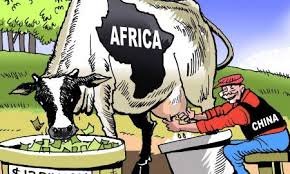Mostly, it’s true. Throughout Angola, Ghana and the Congo, some of China’s largest companies are building roads and railways. They’re backed by Chinese banks, and they’ll pay off their loans in kind through mining and oil deals. All the while, small-scale Chinese entrepreneurs are moving to Africa, opening pharmacies, trading furniture or buying land to farm, much as earlier generations did in Southeast Asia and North America. African governments are welcoming them with open arms, and for the most part, so are Africans themselves.
Earlier literature on China’s rise in Africa pushed us past the easy — and flawed — paradigm of China as Africa’s latest “colonizer.” But in his forthcoming book, China’s Second Continent, Howard French argues the Chinese who migrate to Africa do so as individuals motivated by simple, familiar dreams of opportunity.
A former China bureau chief for The New York Times and veteran Africa correspondent, French traveled the African continent, speaking Mandarin with Chinese men and women who had grown weary of the daily grind in their homeland. The characters French encounters are risk-takers: sometimes foulmouthed, often lucky and universally ambitious.
This interview has been condensed and edited.
OZY: What has lured a million Chinese people to Africa?
French: Many Chinese people came here in the first wave because they were part of a work crew that built a big project somewhere. They typically came with absolutely no idea of what they were going to find on the ground, what Africa would be like. Some people that thought this place would be horrible, [with] hostile people or dangerous animals and diseases, find out it is also fairly pleasant: “I feel comfortable navigating in this society. And most importantly, everywhere I look, there are opportunities to make money.” They come and see opportunity everywhere they look.
This is the beginning of … the creation of a massive diaspora of a trading and investment class of people of Chinese extraction.
OZY: What’s the incentive for China?
French: Today, the opportunism is a capitalist opportunism. It’s China looking out at the world, I think very astutely, starting 10, 12, maybe 15 years ago, saying: We have the possibility of having powerful companies that can compete on the big stage with the best of the rest. The West [isn’t] engaged in any terribly dynamic or interested way in Africa, economically speaking, and therefore this is an opportunity for us to come in and allow our companies to expand, to build international expertise, to build markets, etc.
OZY: Why do you focus on the individuals?
French: This is the beginning of a historically important phenomenon: The creation of a massive diaspora of a trading and investment class of people of Chinese extraction. If you think about the economic history of the world in the last 500 years, big trading and investment diasporas — wherever they may be from — tend to have a huge impact on the subsequent political-socioeconomic [climate] of their destination countries.
Big projects completed by big, government-owned companies dominate the headlines about the advancing Chinese agenda in Africa. But history teaches us that very often reality is more meaningfully shaped by the deeds of countless smaller actors, most of them for all intents and purposes anonymous. – Excerpt from China’s Second Continent
OZY: Is there something different about the Chinese people who decide to come?
French: They come from very ordinary places in China, where cosmopolitanism is not their experience. To get out to Africa — which is psychologically as remote a place as you can get — means almost by definition you’re already dealing with a very special group of people.
These Chinese people, whether or not they knew what they were getting into (and usually they didn’t), had a very special kind of pluck about them, a very special willingness to get out of the mainstream of their own society and to search and explore the world, to take some risks.
OZY: So they come to Africa to escape something back at home?
French: We have this image of China getting rich, the number of billionaires. China is in fact a really tough place for most Chinese people. So it’s not such a stretch to imagine why 1 percent or 3 percent of the people of that country would say, “Hey, there’s got to be some better way. There’s got to be some place where things aren’t so tough or where there’s more readily available opportunity for me.”
Time and again, Chinese told me they did not fully realize how oppressive things were at home until after they had left. Living in Africa, they said, it felt as if a lid had been removed from a giant pressure cooker. Now, they could breathe. – Excerpt from China’s Second Continent
OZY: Is it true that the Chinese take an apolitical approach to the continent?
French: Apolitical in the sense that they don’t project a system of values onto the country that they’re dealing with. They are very political in terms of reading the scene in each country they go into… .The Chinese are interested in catching up with the West, which has an incredible legacy of investment in the continent.
OZY: Is this just temporary? Are Chinese just here to get rich and go home? Or are they truly immigrants, wishing to stay?
French: None of the Chinese I met while reporting this book said to me, “I plan to go home in three years,” or whenever. The main thing for them is: “I’ve got to make this thing work.” They don’t want to go back to China, having spent three years or eight years or 15 years in Africa, and not having anything appreciable to show for it.
Jacob Kushner reports on aid, human rights and foreign investment in Africa. He is the author of the eBookChina’s Congo Plan: What the Economic Superpower Sees in the World’s Poorest Nation. Follow him on Twitter @jacobkushner.
Ozy.com USA TODAY

























